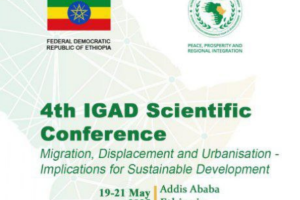
Africa’s rosy prospects are mainly hinged on its capacity to generate adequate energy that propels the continent’s development aspirations. Africa’s reach water resource, be it underground or surface ones, make the continent an ideal clean energy hub on our planet.
Ethiopia is regarded as the ‘water tower of Africa’. Ethiopia’s rivers, most of them transboundary ones, have an enormous amount of potential to produce the much-needed energy in Africa. If countries work jointly in the spirit of Pan-Africanism, the ‘water tower’ can achieve its ambition of becoming ‘the power house of Africa’.
According to data obtained from energypedia, the country has an estimated hydropower potential of up to 45,000 MW and is the 2nd largest with hydro power potential in Africa following the Democratic Republic of Congo. It is equivalent to about 45% of Africa’s total hydropower potential. With its vast potential, Ethiopia has embarked on ambitious plans to develop its water power resources as a means of promoting regional energy cooperation, enhancing power trading, developing power infrastructure, and facilitating renewable energy development in Eastern Africa. Ethiopia plays a leading role in addressing energy challenges, improving energy security, and unlocking the socio-economic potential of the region through a reliable, sustainable, and interconnected power system.
Eng. Habtamu Itefa (PhD), Minister of Water and Energy, emphasized the country’s regional leadership role in creating energy links with neighboring countries during his presentation at the World Future Energy Summit in Abu Dhabi. The forum, which is taking place from April 16 to 18, 2024, aims to foster pan-African cooperation in renewable energy development and ensure energy security.
He stated Ethiopia’s commitment regarding cooperation and coordination in the region, particularly in laying the foundation and bolstering regional energy linkages. He noted that in spite of the fact that Sudan is under internal conflict, Ethiopia has still continued to supply energy, demonstrating its dedication to regional collaboration.
Speaking of regional connectivity and integration, East African Power Pool (EAPP) is an initiative that focuses on promoting cooperation and integration in the power sector among Eastern African countries. Its objectives include: enhancing energy security, promoting economic development, improving access to electricity, and facilitating the exchange of power resources among member countries. By pooling resources and coordinating efforts, the EAPP aims to address energy deficits, reduce reliance on costly fossil fuel-based power generation, and promote the development of renewable energy sources.
Accordingly, Habtamu elucidated that Ethiopia, in collaboration with its development partners, is actively playing a significant role to solidify and maintain regional initiatives like the East African Power Pool. The country intends to expand various infrastructures, including power lines, roads, and telecom networks to its neighboring nations. Such an act of expansion will not only facilitate energy transfer but also it will foster greater connectivity and regional integration.
The Ministry of Water and Energy has incorporated a regional coordination strategy into Ethiopia’s short, medium, and long-term national plans, with an eye toward its development at the continental level. The minister emphasized that Ethiopia’s experience in harnessing its hydropower potential has positioned it as a leading center for green energy in East Africa. The country’s expertise in building and managing energy facilities has garnered international recognition.
Ethiopia’s notable hydropower projects include the Abbay Dam (Grand Ethiopian Renaissance Dam, GERD) which is under construction along the Abbay River, and among others. Once completed, it is expected to be the largest hydropower plant in Africa, with a capacity of 6,450 MW. This potential is expected to fulfill the demand for electric power in the region.
In addition to Abbay Dam, Ethiopia has developed several other hydroelectric projects that contribute significantly to its energy mix such as: Tana Beles and Genale Dawa III hydropower projects. These initiatives have helped Ethiopia increase its electricity generation capacity, reduce reliance on fossil fuels, and promote sustainable development.
Moreover, Ethiopia’s commitment to renewable energy extends beyond hydropower. The country has vast untapped potential for other clean energy sources like wind power and solar energies. These resources complement the hydropower sector, providing a diversified and environmental friendly energy choice.
Ethiopia’s water power potential is not only crucial for its own development but also holds great significance to the Horn of Africa at large. The country has been actively engaging in regional energy integration projects, aiming to export electricity to neighboring countries, including Sudan, Kenya, and Djibouti. Besides, Ethiopia has an agreement in place with Tanzania. Interests emerging from nations like South Sudan, Somaliland, Uganda, and Rwanda indicate the region’s willingness to import electric power from Ethiopia. Such initiatives foster regional cooperation, stimulate economic growth, and contribute to the overall development of East Africa.
Having stayed with the Ethiopian Press Agency (EPA) a week ago, Yacob Arsano, an Associate Professor at Addis Ababa University, expressed confidence in Ethiopia’s ability to navigate external pressure challenges, drawing on the experience gained from the GERD and the country’s diplomatic skills. As the first of many large-scale dams planned for the future, the lessons learned from the Abbay Dam will inform and direct Ethiopia’s approach to upcoming projects, opening doors for improvements regarding management and mitigation of potential concerns.
Looking ahead, Yacob emphasized the importance of organized diplomacy at the national level to bolster Ethiopia’s position on the international stage. Thanks to its proactive engagement in regional and global affairs, Ethiopia’s strength and influence are poised to grow in the future, he highlighted. By leveraging its diplomatic capabilities, Ethiopia aims to address any grievances or misunderstandings that may arise from its dam projects, fostering greater cooperation and understanding among all stakeholders involved.
Again, Habtamu further stated the importance of public-private partnerships in Ethiopia’s energy sector. The government is actively incorporating the private sector to spur investment and innovation in energy development. By implementing collaborative initiatives with private enterprises, Ethiopia aims to accelerate the growth of its energy infrastructure while fostering economic development.
Ethiopia has already established power connections with three neighboring countries based on its continental power system master plan. The minister vowed to further strengthen these connections and stretch its hands of power supply to additional nations. However, he stressed the need for substantial investment, highlighting the crucial role of development partners in supporting the construction and development of power infrastructure.
He also emphasized that Ethiopia’s engagement in energy development investments extends beyond its national borders. By undertaking these ventures, Ethiopia aims to contribute to job creation and address peace and security issues in the region. The country sees energy development as a catalyst for socioeconomic progress and regional stability.
Abbay Dam is a project that serves as a testament to Ethiopia’s commitment to regional integrity, stability, and economic development. Developing its own resources, Ethiopia aims to emancipate its people from poverty and contribute its share to the progress of the African Continent. The completion of the Abbay Dam will mark a significant milestone in Ethiopia’s journey towards becoming a regional powerhouse, driving economic growth, and improving the lives of its citizens.
Besides, Ethiopia’s water power potential in East Africa is a remarkable asset that positions the country as a key player in the region’s energy sector. With its abundant water resources and ambitious hydropower projects, Ethiopia is paving the way for sustainable development, energy self-sufficiency, and regional cooperation. As Ethiopia continues to tap into its water power potential, it holds the promise of a brighter, greener future for both its citizens and the broader East African community.
BY FIKADU BELAY
THE ETHIOPIAN HERALD THURSDAY 18 APRIL 2024




